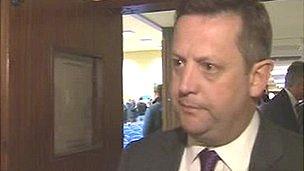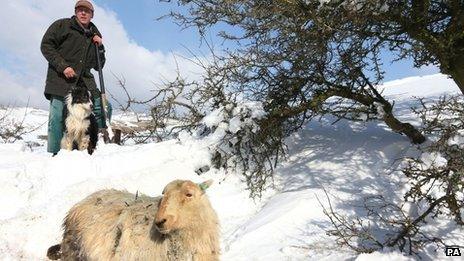Snow-hit farmers meet minister over livestock loss
- Published

Alun Davies said the farming industry had a future
Wales' farming minister has defended the support to those struggling to cope after losing livestock in the recent heavy snow.
Alun Davies met 300 farmers but 20 walked out after presenting him with a letter calling for his resignation.
Hundreds of sheep and lambs were lost in March.
Farming unions were disappointed more help was not offered but Mr Davies said overall the meeting had been a good one.
He said he had responded to concerns by relaxing rules relating to burying carcasses.
Following the animal losses, the Welsh government relaxed European Union (EU) rules in April which require farmers to pay others to remove carcasses from their land.
In meant that farms in parts of Conwy, Denbighshire, Wrexham, Gwynedd, Flintshire, Ceredigion and Powys were allowed to bury their own sheep, lambs and calves over a set period.
Despite the relaxation of the rules, farmers have failed to convince Mr Davies, the Minister for Natural Resources and Food, that they should be compensated for their losses leaving many angered.
Around 300 farmers were at the meeting in Bala and about 20 walked out after about 30 minutes.
'Walk out'
They said two weeks ago another meeting in Dinas Mawddwy, Gwynedd, called for Mr Davies' resignation, and on Thursday they handed him a letter calling for him to go.
One of those who walked out was Ed Edwards who said: "After half an hour of speaking by Alun Davies we got nothing but negativity so we walked out.
"He didn't offer anything to those who had lost sheep, he's shown no support what-so-ever."

Laws were relaxed so that farmers could bury their animals following the snow
Farmer Aled Jones also walked out adding: "The minister came out to see us on the farm to see for himself what had happened.
"He was talking of maybe giving us help to restock, to build a shed.
'Underpins economy'
"What he's offered now is nothing compared to our losses."
The Welsh government has donated £500,000 to farming charities to help with fodder shortages, the removal of fallen stock and for pastoral support and advice.
Mr Davies said the meeting had been a good one with "clear conversation and discussion about the agriculture over the past weeks and months".
He said the second half of the meeting was about the future.
"I wanted to hear what people had to say this evening, I wanted to listen to what they had to say about the future of agriculture and there's been a lot of good suggestions made.
"They've been talking about the system of payments that underpin a successful and profitable industry in the future."
He said people had been talking about how to make a profit, how to run a better business in the uplands of Wales.
The industry "underpins" the rural economy and rural communities.
He dismissed those who had walked out adding the farming industry has a future and those who stayed are "not playing child's games".
"I outlined the support package we've put in place over the past few weeks to deal with the severe weather the sort of support we've put in place.
"We're the only part of the UK that isn't just supporting the business but supporting the farming families and farming communities", he added.
The Welsh government is in talks with the EU to bring forward single farm subsidy payments to help with cash-flow problems for those worst-affected.
Mr Davies has also commissioned an urgent review of the medium and long term resilience of the industry against future incidents of severe weather.
But Ed Bailey of the National Farmers' Union in Wales (NFU) said there was a lot of disappointment, "strong feelings and frustrations".
"I think people had been expecting some form of announcement but he was quite adamant there would be no more," he said.
"The minister referred to a £500,000 payment by the Welsh government to farming charities but some feel it's unfair to expect farmers to go cap in hand."
Emyr Jones of the Farmers' Union of Wales (FUW) said farmers had been hoping for more help.
"If he had offered to pay half the cost of disposal that would be something. It's a good thing they are giving money to farming charities, they do a lot of good work, but these organisations help families suffering with bereavement and other serious tragedies.
"Farmers don't feel comfortable asking for help from charities in these circumstances."
- Published23 April 2013
- Published16 April 2013
- Published14 April 2013
- Published9 April 2013
- Published4 April 2013